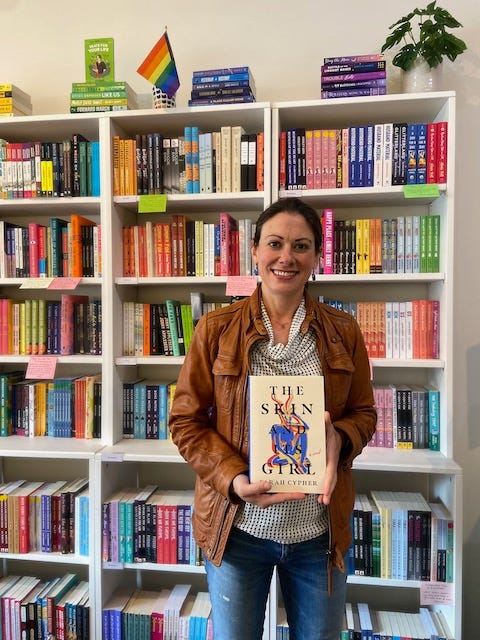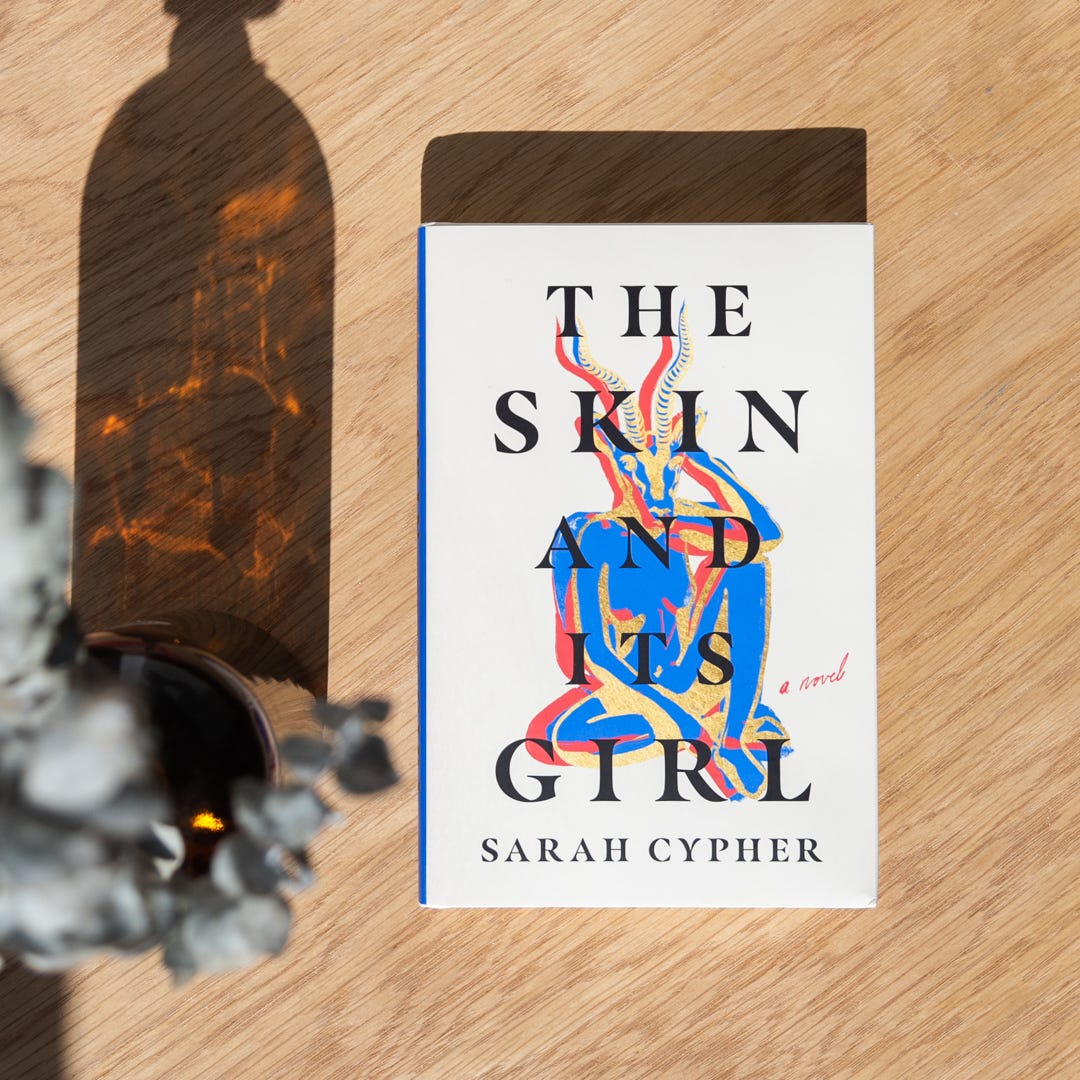A reasonably comprehensive guide to working with everyone on your publishing team.
Or anybody, really, when you're still figuring out what the heck you're doing.
Today, The Skin and Its Girl has been published for one week, and my out-of-office message is about to expire. Imagine the best birthday of a lifetime, softly electrified with nerves and good anxiety. There is so much to be grateful for, not least of all some good reviews, but this solitary soul is newly convinced that anything is possible if you do it with good people.
I don’t just mean a good publishing team. I also mean my wife Erin, the oodles of friends and relatives who preordered the book and then painted Instagram with photos of their copies, and especially the book community. It’s a treat to see my cover in bookstores, see readers posting about it on Instagram, and get to do events with folks like
, who has built a buzzing community around reading and who spotlights queer and Latinx stories. I loved the interview conversations with old friends like Laura Stanfill of , Leena Akhtar of Queer Everything, Carinn Jade at Pop Fiction Women, and more. There is so much goodwill to go around that I’m almost ready to relinquish my misanthrope card.Goodwill is arterial in the economy of generosity—i.e., the system where people do things because they want to and because it’s nourishing.
This goodwill economy is an alternative to transactional favors and exploitative capitalism. I guess it’s also a frame of mind. In this post, I try to recollect most of the decisions it drove as I worked with The Skin and Its Girl’s publishing team.
But real quick: see me in person or online at this week’s free events! There’s one at Brooklyn’s Center for Fiction on Wednesday, the Writer’s Center on Thursday, and White Whale Books in Pittsburgh on Friday. I also wrote about Turkish cats for Lit Hub, and recommended many direct-address books for Electric Literature.
First: General Stuff I Learned
In Jami Attenberg’s newest
post, which I link to further down, I really connected with what she said about writers being overachievers. We are good at pouring energy into projects, and truthfully, this feels natural for me as the owner of a freelance editing business as well. So what can a DIYer bring to the sudden experience of teamwork? Here’s what I did for each collaborative component of the process.Be organized: This is an easy one for overachievers. Use GCal or whatever you use, and have separate colors for publicity tasks, social media tasks, and internal tasks. Build a few extra days into every deadline, since it never hurts to be early. Ask questions if a process is confusing. Also, you don’t need to share every idea as you have it; compiling related things into a single email every few days or weeks worked well (until the very end, when email traffic gets unavoidably heavy). I sent a lot of bullet lists.
Do your share of the brainstorming: and that share is not “zero.” Most publishers give you an author questionnaire to fill out soon after signing a contract in which you list potential blurbers, institutional and media connections, public speaking history, etc. This is just the beginning of your book’s media effort—not the end. You can pick up a lot of good ideas by watching what other writers do and by asking around.
Give a small, thoughtful gift: As a newbie, I knew I’d need my team’s goodwill and patience, so I wanted to set a good tone. There are a lot of ways to signal this, but I enjoyed sending a cube of Palestinian soap (relevant to my book) to every new team member if they wanted one. Not everyone did, but for folks who like getting mail, I was happy to do it.
Take care of yourself: Sometimes the process will be stressful, frustrating, disappointing, and/or confusing. For example, I was bummed when the book didn’t get a UK deal (some 25 invisible nos, blurgh), and when some of the essays I wrote came close to publication but didn’t quite get there. I felt bad for interviewing folks whose words and time didn’t get the satisfying audience I’d hoped. I also felt pretty overwhelmed near the end of the process, when I constantly had six or eight big tasks in the air and they were all new to me—the learning curve is often steep, and imposter syndrome is real. Rather than repeatedly taking this out on your partner, friends, publishing team, family, neighbors, or pets, be intentional about taking little breaks for fun exercise, healthy food, and sleep. If I ever have another book come out (inshallah), I will definitely make a better effort to drink less wine and schedule more nature walks, because less alcohol = better sleep, and nature = calm. Good sleep and calm generally keep me from running around with my hair on fire.
Before the Launch: Editorial
Agent interactions: I’ve written about how to work well with your agent on revisions and prepare for the editorial submission process. Check it out here! But also, ask your agent what their communication preferences are. Adam said up front that unless I was sending a personal, random little email to my editor, he wanted to be copied on everything. Later in the process, I’d leave him off of “middle iterations” of scheduling events and other planning, but essentially, he has been on every thread, updated about every final draft of media things, every piece of publicity, and every effort in the process. I feel very sorry for his inbox.
If your publisher offers you a seat at the table, bring value, not headaches.
Editor interactions: I’m sure every writer has their own style of communicating with their editor, but since Chelcee is The Skin and Its Girl’s team captain, I copied her as often as I copied my agent on book- and media-related emails. When we worked together on revisions, I shared clear deadlines, let her know in advance of any problems, and when I found a late typo, she was even able to fix it at the eleventh hour before publication. Although I suspect she is an equally amazing collaborator with all her authors, I felt like it was important to earn her trust as a debuting writer—early in the process, she included me in brainstorming about the cover and sought my opinion about granular details like the kind of paper the cover would be printed on. I never took that inclusivity for granted and aimed to deliver good input concisely and kindly. If your publisher offers you a seat at the table, bring value, not headaches.
Copyeditor and proofreader interactions: These were two different kinds of edits, but in my head, I call the collective process “copyauditing.” These editors do their damnedest to prevent you from looking stupid. And I promise, the endless queries in the margins—if done by a skilled editor—are not meant to be exasperating. Although I didn’t reply to every edit (if I agreed, I usually just accepted it and moved on), I did acknowledge good catches, edits that really improved a line, and good suggestions that I needed to reject for other reasons. If I needed to respond to a query, I did it with kindness. Editing is often thankless work, so say thanks. Also, expect one or two rounds of follow-up queries, and respond promptly. When these tasks are done, the book can go into production.
Audiobook producer and actor interactions: Different publishers handle audio differently. A friend at an indie press was given his choice of three actors. At PRH, I worked with a dedicated audiobook producer who had already selected the actors to read The Skin and Its Girl, but I was given the final signoff. Victoria Nassif and Haneen Arafat Murphy did an awesome job, and we ended up being friends on social media, and they also ended up doing a play together—i.e., what was just a one-off job turned into some beautiful connections. I’m not sure what the takeaway here is, except that I love audiobooks and was especially thrilled by this process, and maybe that excitement showed. Oh, and expect to be given a long list of words and names to pronounce for confirmation. We handled this via WhatsApp voice recording, and it was a little tricky because I needed double-confirmation of Arabic and Hebrew pronunciations, but it was a good example of handling any larger-than-expected tasks with patience and relative efficiency. Expect these to crop up fairly regularly, especially if you’re debuting.
Before the Launch: Publicity and Marketing
Say yes: It’s my first book, so I said yes to everything. Every interview, every reading, every book-rec list, every social media post, every essay idea, every newsletter mention. Do these sell books? I have no idea. Do they connect with readers? Maybe. I hope so. A lot of it was time-consuming, almost none of it pays, and some of it scared the hell out of me (public events!) but if you spend years of your life writing one book, why not try everything? As long as none of it costs you your dignity, you’ll come out of the experience with new skills and confidence. I’m much less scared of public events now.
Answer emails quickly. Be organized. Hit deadlines early. Always say thank you and mean it.
Publicity interactions: This one deserves a whole separate post—e.g., why I hired an indie publicist, how she and the in-house publicist worked together, and what this process even is. But here’s the thing to know: publicists are always super-busy, they’re doing a TON of legwork for you, they insulate you from rejections, they come up with most of the good media ideas for your book, and they do almost all the labor of pestering people so you don’t have to. I am exhausted, but I would be a smoking crater if it weren’t for Kathy and Chelsea. They’re the people I’ve talked to the most this year. BE NICE TO YOUR PUBLICISTS. Send them a little gift. Answer emails quickly. Be organized. Hit deadlines early. Always say thank you and mean it. Say thank you again, and mean it that time, too. In a ceaselessly roaring media environment, they are conjuring focused attention on your book. It takes wizardry and no small amount of goodwill.
Marketing interactions: This is the piece that seemed to happen mostly behind the curtain. The publisher has a budget to buy advertising and anything related to selling the book. It’s why book tours are usually short if they exist at all: spending $700 to send an author across the country to sell maybe 30 books at a reading does not get the ROI that spending $700 on an ad buy might, or so I’m told. Some of the interviews and social media posts I did were at the request of Jordan and Corina, this novel’s marketers extraordinaires, and the opportunities were always interesting: e.g., an interview for The Trevor Project, a fun #writersroutine post about my writing space.
Maintaining a digital presence: Thanks to an invested and well-resourced publisher, I have “digital assets” to last for the whole public life of this book—pretty “lifestyle” photos of the book in sunlight, graphics featuring quotes from the book, blurbs, and more. Even more important is a presence on whatever social media platforms you use, but a near-requirement is a website. I’m going to do a separate post about this because it’s so important; I’ve updated my site at least 100 times this year, no hyperbole, and found it helpful for a few other tasks as well. People will ask you for a lot of the same things over and over, and centralizing that information saves everyone time.
Launch Time: Events and Interviews
Work on your narrative: Jami Attenberg’s latest Craft Talk post, “What to Expect When You’re Expecting” helpfully suggested using the slack time before publication to hone what you want to say about yourself and your book once you’re in the public eye. I echo all of this, and will just add that if this is something you’re worried about, ask your publishing team for help. My awesome publicists, Kathy Daneman and Chelsea Woodward, along with my editor Chelcee Johns, chatted with me for an hour over some of the points I wanted to cover—especially related to my queer identity, the writing craft, and how far I wanted to go in talking about the surge in occupation-related violence happening in Israel and Palestine right now, which all relate to my book. A lot of it felt delicate, and I appreciated the extra time they took to help me think this through.
Send talking points: Based on the above, the publisher also created a one-page document of about seven “talking points,” or answers to common questions that were each a few sentences long. While most of the subsequent interviews elicited similar information more organically, the document helped in two ways: (1) I had a better sense of my conversational home base to steer back to if I rambled, and (2) interviewers and event partners seemed to appreciate getting these a week or two ahead of time, just to calibrate what we each hoped to talk about.
Post the heck out of stuff: Most of the event venues also created social media graphics for readings and such. For the latter, post often and link to their RSVP pages, because this is how they know how many books to order and chairs to set up.
Sign books at indies, but there’s a protocol: “Signing stock” is a thing—you drop in, sign the books, and they put a “signed by the author” sticker on the cover that sometimes makes the book more appealing to customers. Booksellers are the unsung gatekeepers, and they have a LOT of books pushed at them. They’re also trying to run a store. So there’s a right way to approach this. I sent a list of six local indies to my publicist, who made sure the stores had even ordered copies, and then called for permission to have me drop in and sign books; further, I called the store the morning of the visit and asked what time was best for the staff. The whole visit usually took 5–10 minutes at most, but we got selfies, and I posted them afterward so the store could use them in promo efforts. Basically, the store is doing you a bigger favor than you are for them, but it’s a really fun exchange when it goes well.
Support your in-conversation partners: This advice may not be feasible if you do a lot-lot-LOT of events, but I bought and read the most recent book by each writer I did an event with. It just feels like the right thing to do.
Send follow-up thank yous: Look, it sucks to moderate someone’s event if they make you feel like you’re just an intelligent manikin that gets wheeled back into the closet after you do a thing for them. Reading a book, composing thoughtful questions, and showing up at a public event as an introvert takes time and energy. It’s fun and worthwhile as long as you do the event as equals and feel appreciated. The same goes for the event staff—booksellers, usually—who are doing the grunt work and a lot of the social media publicity to make the reading happen. Honor other people’s efforts.
Don’t forget about the rest of your life: I put an out-of-office on my work mail just to let folks know I’d be slow with replies, did extra chores around the house because my wife definitely did all the driving to my events and bookstore visits (DC drivers stress me out). Talk to friends and remember that it’s not all about you. My pub week flew by, and I tried not to be unbearable, even though I probably was, a little.
Remember it’s okay to feel special (your book is out!!!), but remember, after every event you gotta go home and take your socks off one foot at a time like everyone else.
Conclusion: Readers & Community
This is what all the rest of it is for. I have loved connecting with people because of this book—making new friends, seeing readers relate to the story, meeting new peers, and just sharing warm-and-fuzzy literary love with librarians and booksellers. Family and friends have sent a massive joystorm my way, and I am feeling very loved. So much of my community is on Instagram, which has turned out to be a digital forum for most of these interactions, but my in-person launch event was such an amazing gathering that I pretty much forgot to take photos.
All of this to say: My heart is full, and I wouldn’t change a thing. I wish this for you in whatever labor you love best.





Thank you for taking the time to write this. I found it super helpful!